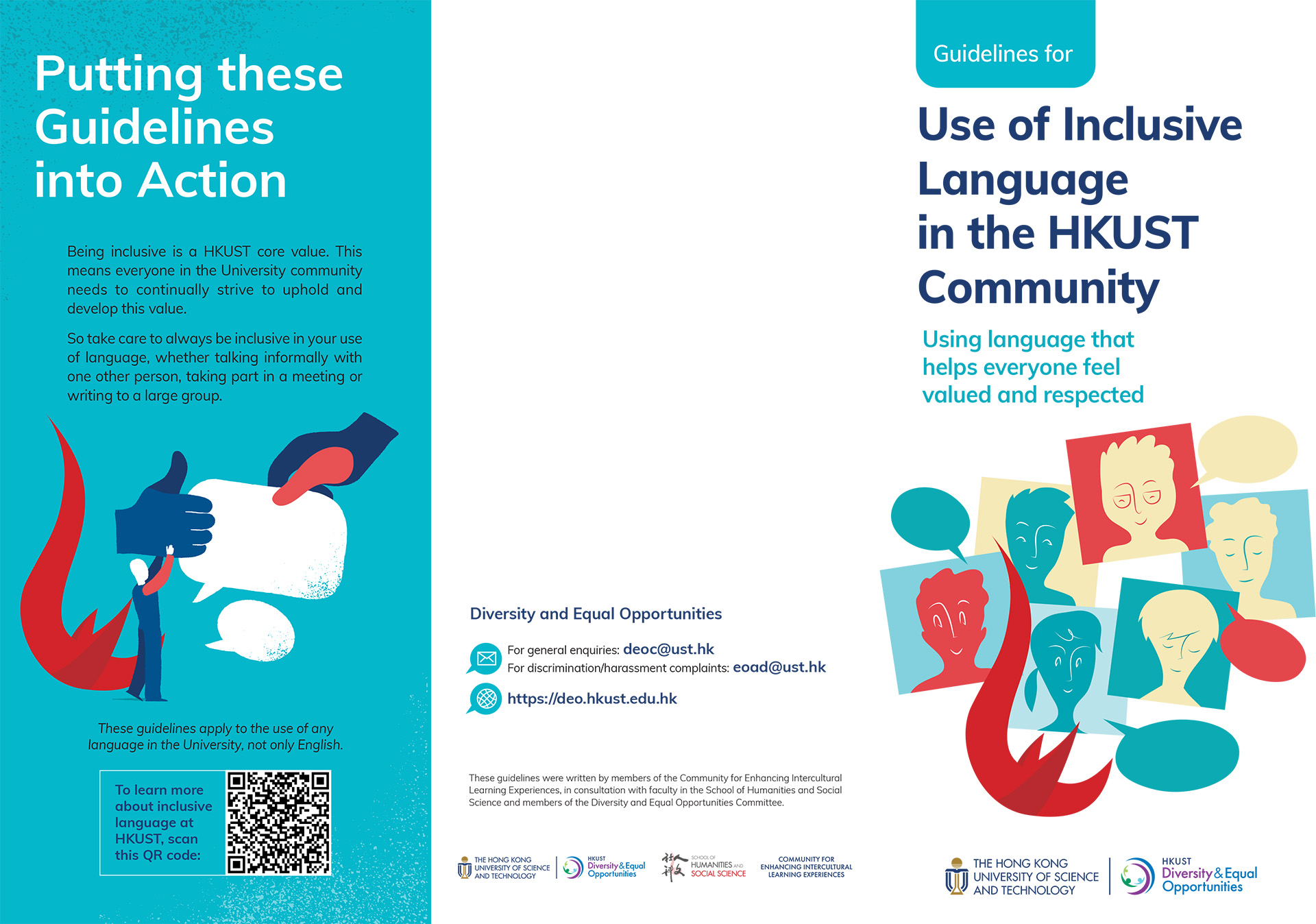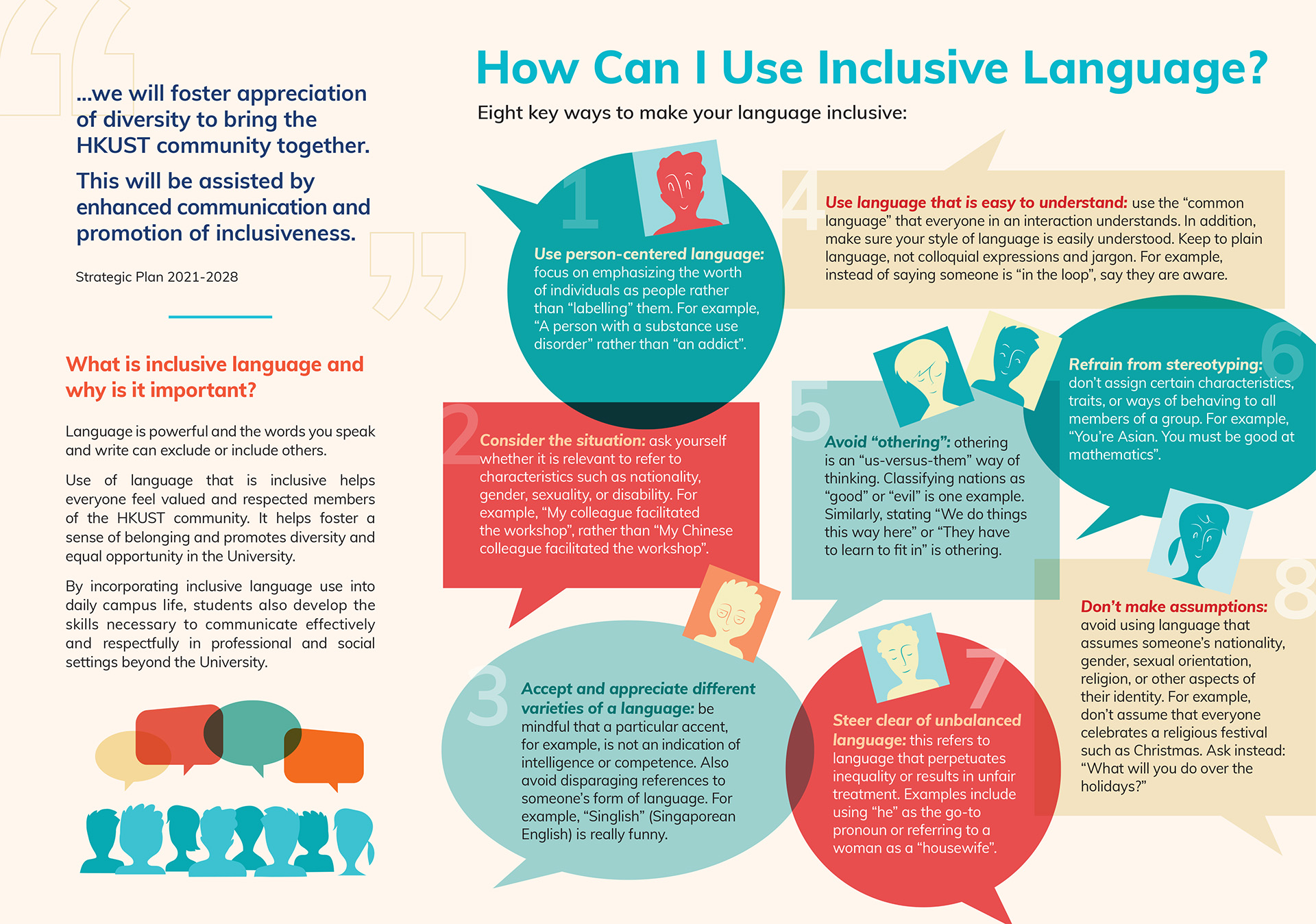為了促進和維護多元、包容和開放的學習及工作環境,並確保包容性和平等融入大學其功能、運作和活動中,大學制定了《平等機會及反歧視政策》。
同時亦建立了《處理歧視及騷擾個案程序》,設定處理大學內歧視和騷擾投訴的機制。點擊此處下載投訴表格。
《防止及處理歧視及騷擾﹕管理人員指引》(只提供英文版)提供了預防工作場所/學習環境中的歧視和騷擾的建議和最佳實踐方法。
為了協助大學成員將包容性語言應用於大學學習、研究或工作環境中,大學製作了《包容性語言指引小冊子》(只提供英文版)和《包容性語言指引宣傳單張》(只提供英文版)。
政策與指引:
- 按照大學校董會通過的策略發展計劃,大學致力於營造及維繫一個多元、共融及開放的學習及工作環境,令大學社群的成員(包括學生、教職員及其他職員)均得到公平對待和享有平等機會,同時珍視多元價值。大學竭力確保平等原則於其運作和活動體現。大學極力打擊、消除任何形式的歧視、騷擾及偏見,讓不同人士能在公平環境工作或學習。
- 為達至共融及促進一個令每位成員都感到受尊重的氛圍,大學及個人的付出同樣重要。大學每位成員均有責任互相尊重和恪守大學共融的理念,並阻止所有形式的歧視、騷擾或中傷。
- 有見及此,大學成立了多元及平等機會委員會,其職責包括:督導有關平等機會、多元及共融的事務;提升校內成員對平等機會議題的關注和教育;和處理有關歧視及騷擾的查詢和投訴個案。
- 如欲就平等機會事項作出查詢、申訴或請求協助,可聯絡以下辦公室/職員:
- 多元及平等機會委員會(電郵至eoad@ust.hk);
- (職員適用)所屬學院/部門/辦公室/單位的管理人員、多元及平等機會資源人員;多元及平等機會資源人員的名單刊列於大學的多元及平等機會網頁可供參考;
- (學生適用)導師、多元及平等機會資源人員、舍監及/或宿舍導師。
-
大學設立了處理歧視/騷擾投訴程序 (「程序」),列明處理香港反歧視條例 涵蓋的申訴或投訴的機制。其他不在香港反歧視條例涵蓋範圍的歧視投訴如落入大學其他程序所涵蓋的範圍,例如 Regulations for Student Conduct、處理員工申訴的程序或Whistle-blowing Policy,大學將按有關程序另外處理。
- 大學鼓勵成員在遇上歧視/騷擾事件時,向上述第4段的人員尋求支援。大學尊重個人選擇和自主權,無論成員是否選擇啟動正式程序,大學均會在需要時提供支持和建議,同時確保所有溝通均會被保密,以保障成員的私隱。
1香港反歧視條例禁止基於性別、懷孕、餵哺母乳、婚姻狀況、殘疾、家庭崗位及種族而產生的歧視,以及性騷擾、基於餵哺母乳的騷擾、及基於殘疾及種族的騷擾和中傷。
最後更新:2025年1月
(請按此瀏覽完整內容。)
A. 適用範圍
- 此程序適用於任何由以下人士作出,及針對以下人士所作的歧視/騷擾投訴:在校就讀的全日制或兼讀制學生及全職或兼職職員,及以大學名義進行活動的人士,例如合約員工、服務提供者、實習生及義工。程序亦適用於在大學校園進行及與工作或學習相關的活動,包括於校園以外、香港境外或於一般工作時間以外進行的活動。
- 大學將盡力在實際可行情況下執行此程序,然而,此程序對大學並不構成約束,大學亦保留不按此程序而以行政或其他適當方式處理與歧視/騷擾相關事宜或投訴的權利。大學亦會不時修改或更新此程序。
B. 受禁止行為的定義
- 任何大學職員、學生或成員均有權就該等在以下四項香港反歧視條例1中被視為違法行為的歧視、騷擾或中傷作出投訴: 以上條例禁止在訂明活動範疇內基於某人的性別、懷孕、餵哺母乳、婚姻狀況、殘疾、家庭崗位及種族而作出的歧視及騷擾行為。訂明活動範疇包括僱傭、教育、貨品/服務及設施的提供、處所的處置及/或管理、及參與會社和體育活動。
- 歧視分為兩種—直接歧視及間接歧視:
- 直接歧視是某人基於一個受保障特徵而遭受較差的對待,例如基於其性別、懷孕、餵哺母乳、婚姻狀況、殘疾、家庭崗位或種族;而
- 間接歧視是在沒有充分理據的情況下,將一項劃一的條件或要求加諸於所有人,但這實際上會對具以上受保障特徵的人士產生不利影響。
- 本程序應涵蓋以下按四項反歧視條例受禁止的歧視/騷擾行為:
- (a) 性騷擾
- (b) 性別歧視
- (c) 婚姻狀況歧視
- (d) 懷孕歧視
- (e) 餵哺母乳歧視及騷擾
- (f) 殘疾歧視、騷擾及中傷
- (g) 家庭崗位歧視
- (h) 種族歧視、騷擾及中傷
- (i) 使人受害的歧視
1詳情請瀏覽平等機會委員會網站: https://www.eoc.org.hk/zh-hk/about-the-eoc/introduction-to-eoc.
(請按此瀏覽完整內容。)
點擊此處下載投訴表格。
A. Introduction
Diversity, inclusiveness, respect and equal opportunities are of our highest priority at HKUST. All staff and students, regardless of their backgrounds, are expected to comply with the relevant policies and to respond appropriately to ensure that prohibited conduct does not occur. Failure to do so may result in the University being held vicariously liable for discrimination and/or harassment, whether or not you were aware that discrimination and/or harassment was occurring or agreed with the act. There is also a possibility that individual supervisors/managers may be held liable if they fail to respond appropriately to complaints of this nature or victimise someone who makes a complaint of discrimination and/or harassment.
Furthermore, discrimination and/or harassment would bring negative impact on the physical and psychological well-being of staff and students. It is found that discrimination and harassment at workplace/learning environment often results in communication breakdowns, conflicts, low morale, absenteeism or resignation etc.
In view of the above, this set of guidelines aims to empower supervisors and managers, or those with leadership responsibilities, at HKUST when it comes to advising on discrimination and/or harassment and suggest best practices for preventing discrimination and harassment at workplace/learning environment.
B. Roles and responsibilities of supervisors/managers
- As supervisors/managers, you have the responsibilities as follows:
- be a role model (on all aspects) to set the tone;
- foster a safe and welcoming workplace/learning environment that is free from discrimination and harassment;
- communicate the University’s policies and procedures regularly and clearly;
- promote awareness on equal opportunities among staff and students;
- recognize colleagues’ good attitude and behavior;
- take each complaint seriously, respond promptly, fact finding (non-judgmental) and suggest possible way(s) forward; and
- keep yourself updated on discrimination and harassment matters by attending relevant training and understanding relevant procedures in the University.
- Having nil discrimination or harassment case reported does not mean such incident does not exist. A supervisor/manager has a role to monitor the workplace/learning environment and identify whether discrimination and/or harassment is evident.
C. Suggestions to supervisors/managers
- If an act is observed in breach or potentially in breach of the University’s policy, please act immediately. You may consider the following:
- discuss with the staff/student whose behaviour is of a concern;
- advise the staff/student sensitively that his/her behaviour is inappropriate and is likely to bring damage to the workplace/learning environment that he/she should stop; and/or
- seek advice from the University’s Equal Opportunities Officer through the email eoad@ust.hk.
- If a staff/student approaches you for reporting a potential discrimination/harassment scenario, you can do the following:
- listen to him/her;
- find out the needs of the staff/student concerned and respect his/her wish;
- provide emotional support, if needed;
- separate the respondent and complainant before the fact-finding is completed, if any potential risk is observed; and
- assist the staff/student to report to the University through the email eoad@ust.hk or law enforcement agencies.
- Supervisors and managers should maintain strict confidentiality for any enquiry/complaints about discrimination or harassment as per the relevant University’s policies and laws.
- However, staff/students who have a concern or a complaint of discrimination or harassment should be encouraged to self-manage the situation, if situation allows, as rectifying the situation immediately is in everyone’s interest. It is, therefore, suggested that he/she may approach the discriminator(s) directly to stop the inappropriate behaviour. Ignoring the concerns may make the situation worse.
- If the attempt made to stop the inappropriate behaviour was not effective, staff/students concerned should consider taking further actions, such as approaching their supervisors/managers for help as a form of informal resolution stipulated in the Procedures for Handling Discrimination/Harassment Complaints.
- Staff and students are advised to record the discrimination/harassment incident clearly, including date, time, venue, any witness(es) and any attempt made to stop the behaviour etc., in case further actions are to be taken.
D. Unlawful acts under the anti-discrimination ordinances
- There are four anti-discrimination ordinances in Hong Kong, namely, the Sex Discrimination Ordinance, the Disability Discrimination Ordinance, the Family Status Discrimination Ordinance and the Race Discrimination Ordinance, that prohibit discrimination on the grounds of sex, pregnancy, breastfeeding, marital status, disability, family status and race, in the prescribed areas of activities, including employment, education, provision of goods, services and/or facilities, disposal and/or management of premises, and participation in clubs and sporting activities. The legislation also provides protection from harassment and vilification, including but not limited to sexual harassment and racial vilification.
- The following are some examples of discrimination and/or harassment at workplace/learning environment:
- Decisions on pay, performance of duties and promotion based on one’s race, sex, marital status, or disability
- Dismiss a staff simply based on one’s family status with an underlying assumption that he/she would not be fit for the work because he/she has family responsibilities
- Create a hostile or intimidating environment for the staff or student who is breastfeeding
- Make offensive or intimidating comments or gestures, or insensitive jokes about one’s disability or sex
- Refuse to hire staff or admit students who are ethnic minorities These examples above are not exhaustive. If you wish to understand more, please visit the website of the Equal Opportunities Commission: https://www.eoc.org.hk/.
- For full text of the University Equal Opportunities and Anti-Discrimination Policy and Procedures for Handling Discrimination/Harassment Complaints, please refer to the website: https://deo.hkust.edu.hk/policy-and-procedures.
E. Best practices for preventing discrimination and harassment at workplace/learning environment
- Dealing with discrimination and harassment cases can be costly, in terms of both resource and time spent. Therefore, some tips and best practices for preventing discrimination and harassment at workplace/learning environment are offered:
- Remind staff and students at your School/Department/Unit of the University’s relevant policies and procedures, and updates regularly;
- Distribute and display relevant training and educational materials at the noticeboard(s);
- Communicate (particularly from leaders) regularly and often to reinforce the message of intolerance for discrimination and harassment; and
- Introduce the Diversity and Equal Opportunities Resource person(s) of your unit to your staff and encourage your staff and students to attend relevant information session or training about prevention of discrimination and harassment (you may contact the Manager (Diversity and Equal Opportunities) to arrange such, if needed).
(Please click here for the PDF version.)
Using inclusive language helps foster a sense of belonging and promotes diversity and equal opportunity in the University.
Inclusive language enhances communication by ensuring that everyone can understand and engage with content, of a course or in a discussion. It helps prevent misunderstandings and encourages the sharing of diverse perspectives. It assists in building positive relationships.
As language is constantly evolving, the HKUST community needs to stay up to date and adapt our use of language.
HKUST graduates will need to navigate diverse societies. By incorporating inclusive language use into daily campus life, students can develop the skills necessary to communicate effectively and respectfully in professional and social settings beyond the University.
Being inclusive is a HKUST core value. Faculty, staff, and students, need to continually strive to uphold and develop this value.
(Please click here for the full version.)

